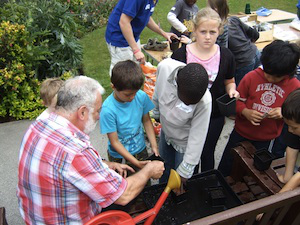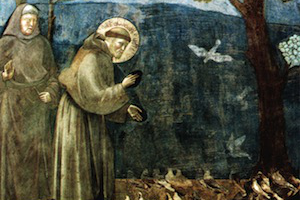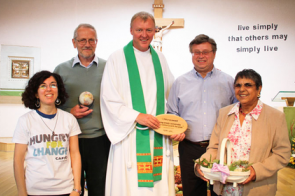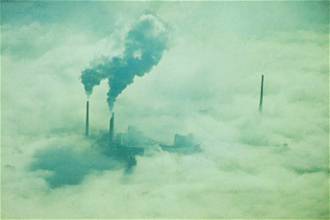Countdown to the Environment Encyclical: 4. Creation-Centred Theology

At a preparation meeting for the new Encyclical in Rome two weeks ago, there was a call for more formation on creation-centred theology. I know that even by using that term hackles are going to be raised in some Catholic quarters!
Well what is creation-centred theology? Does it mean that mainstream 'personal relationship with God' theology is no longer important? And what is the connection with liberation theology?
I remember at primary school back in the 1960s being given a sheet of white paper and asked to draw my soul. The class copied the illustration off the board - an amoeba-looking shape with undefined edges. The teacher then asked us to colour in the shape with our pencils. She told us that these big grey blobs were our souls, which were dirty and full of sin, except that through the redemption of God we each could clean up our souls. We were asked to reflect on good things we had done recently - going to Mass on Sunday being top of the list - and then gradually to rub out the lead colouring. I loved this exercise. It affirmed that I was really a very good girl and I had a lovely clean looking 'soul' by the end of the lesson. That image of my soul, and faith being solely about my personal relationship with Christ stayed with me for the next 20 years.
Of course faith is about building a personal relationship with Christ, but it is more too. Working for CAFOD for eight years in the 1980s developed my faith. We had many of the great church leaders of the time visiting - among them Dom Helder Camara, Cardinal Evaristo Arns, Archbishop Denis Hurley - who told of their faith responses to the poverty and oppression of ordinary people. Their mission was underpinned by liberation theology, based on the mission statement of Jesus to bring Good News to the poor.
I learnt about the preferential option for the poor from Catholics exposed to the realities facing poor communities in the global south. I heard about the lay missionary Jean Donovan, who was murdered in El Salvador in 1980, eight months after Archbishop Oscar Romero. She visited CAFOD in September 1980 - two months before her killing - to speak to Project Officer Clare Dixon about a latrines project for displaced people. She had seemed so ordinary but so dedicated to the poor. She wrote at that time: "I don't know how the poor survive. People in our positions really have to die to ourselves and our wealth to gain the spirituality of the poor and oppressed". It would be impossible to be exposed to these people and not feel engaged with liberation theology. Of course, Pope Francis has a very deep experience along these lines.
But there were other disturbing realities in the global south picked up by CAFOD in the mid 1980s. It was the Live Aid era, but many questioned whether charity alone was a sufficient response to Africa's chronic poverty. Under the heading of 'environment and development' such issues as the nature of progress, human relationship with the environment, poverty and care for the earth, managing natural resources, the costs of our Western lifestyles, faith and ecology were discussed at length. We produced study materials for groups that followed the pastoral cycle of EXPERIENCE > SOCIAL ANALYSIS > THEOLOGICAL REFLECTION >ACTION and we drew on texts from Scripture and Catholic Social Teaching. I can remember fascinating discussions around Romans 8 where St Paul says, "the whole creation until this time has been groaning in labour pains". And discussion about the covenant God offered after the flood - described in Genesis 9 - which was not just with humankind but with "every living creature".
Reading around works by Teilhard de Chardin, Matthew Fox, Thomas Berry, Edward Echlin, Sean McDonagh, and looking back several centuries to such environmental champions as Hildegarde of Bingen, Mother Julian of Norwich, Francis of Assisi, I felt there was a sensitivity within the Catholic Church towards the Earth, but it was far from mainstream. Mary Grey puts this well. Speaking at the 25th anniversary of the founding of Christian Ecology Link (now Green Christian) in 2007 she suggested the focus of liberation theology, which addresses justice for the poor, should be widened to include the Earth; that "we should develop the liberation ethics focus on vulnerable people to encompass vulnerable life-forms and the life of the planet itself". She called for humility to acknowledge, "that we have scarcely begun to understand the wisdom embedded in creation for millions of years before we came on the scene".
Thomas Berry, an American Passionist priest, made it his life's work to explore the connection between humans and the earth. Described in Newsweek magazine in 1989 as "the most provocative figure among the new breed of eco-theologians," Berry felt the planet's environmental crisis is fundamentally a spiritual crisis, with huge implications for religion. His books, including Dream of the Earth and The Great Work, were influential way beyond the Catholic world. In 2007, hundreds attended a conference in Central London held to honour Berry, organised by the Gaia Foundation and other environmental groups. Berry was influenced by the work of Teilhard de Chardin and was president of the American Teilhard Association for 12 years. He himself was inspirational to a younger generation of eco-theologians, including Matthew Fox and Columban Sean McDonagh. Berry felt all religious communities need to see themselves in the context of creation and to play a role in preserving the environment. "The universe is a communion of subjects," he said, "and not a collection of objects". He taught that the "great work" of our time is to establish a mutually enhancing human presence on our planet. This is an important quote from 'The Dream of the Earth':
"We have no functional cosmology to guide and discipline human knowledge. One reason is the negation of the natural world as a meeting place between the divine and the human. Another is regarding the human as having an eternal destiny beyond other members of the created world and therefore alienated from the only context in which human life has any satisfying meaning....... Our generation must provide the spiritual context of the ecological age. The context of contemporary existence has been altered by environmental breakdown."
He did feel that humans have a special place as "creation made aware of itself".
Edward Echlin, in his books, draws attention to the cosmological dimensions in the birth and death of Jesus - the star, the earthquake the descent of unusual darkness upon the earth. "Reconciliation in Jesus of Nazareth, risen and glorified, includes all families and all creatures, the entire earth community, past, present and future" he says. In terms of the sacraments, he takes the view that Baptism reminds us of the sacredness of water and we must respect, and where necessary heal, seas, beaches and all local aquifers with their teeming life. Preparation for Confirmation could include a commitment to consume sustainably and locally, to share transport, to restore ruined local habitats. We could use local organic bread and wine at our Eucharists - "bread which Earth has given and human hands have made" and "fruit of the vine and work of human hands."
Elizabeth Johnson would agree with him when she says: "Rather than being a barrier that distances us from the divine, this material world becomes a sacrament that can reveal divine presence. In place of spiritual contempt for the world, we ally ourselves with the living God by loving the whole natural world, part of the flesh that the Word became."
Four years ago the National Justice and Peace Network's Environment Working Group - 10 years old this year - organised a half day on creation-centred theology at one of the Network quarterly meetings. Among the quotes discussed was this from Rosemary Radford Ruether in her article 'Eco-Justice at the centre of the Church's mission': "Many traditional Christians feel a deep suspicion toward the ecology movement, particularly when it lays claim to theological and religious meaning. They see this as the rise of a new 'nature worship' to be regarded as totally contrary to 'Biblical faith'. What I wish to show in this talk is that the Church's mission of redemption of the world cannot be divorced from justice in society and the healing of the wounds of nature wrought by an exploitative human industrial system. Furthermore that this holistic perspective is central to the Biblical vision of redemption. It is a Christianity that divorces individual salvation from society and society from creation that is unbiblical."
Let's see if Pope Francis says something similar in his new encyclical.... and if he does it will be pretty explosive!
See the Bishops' Conference of England and Wales resources on environment here: www.cbcew.org.uk/CBCEW-Home/Departments/International-Affairs/Environment/Theology-Resources


















